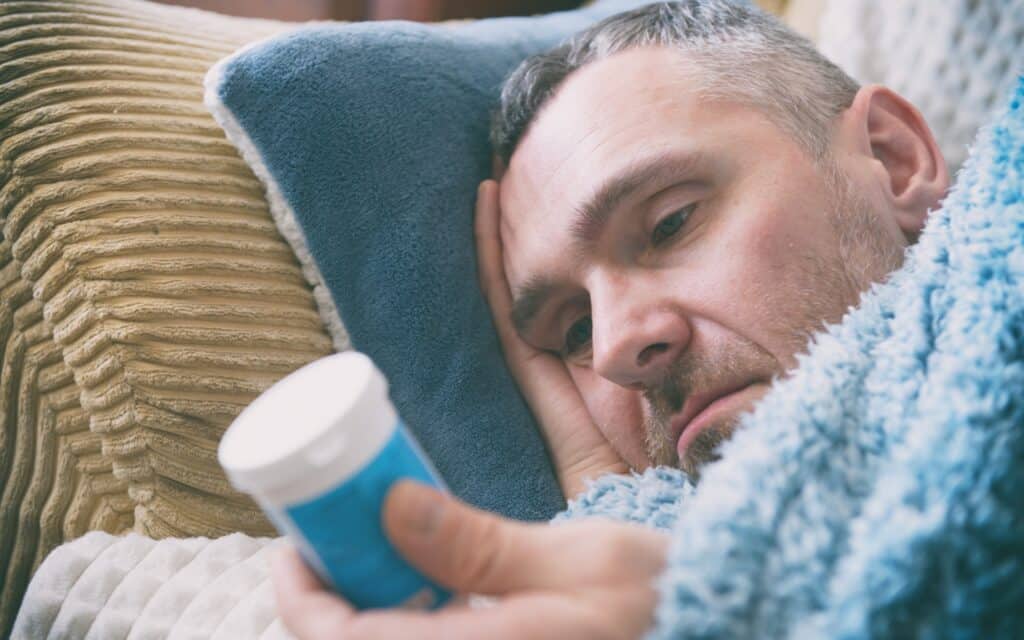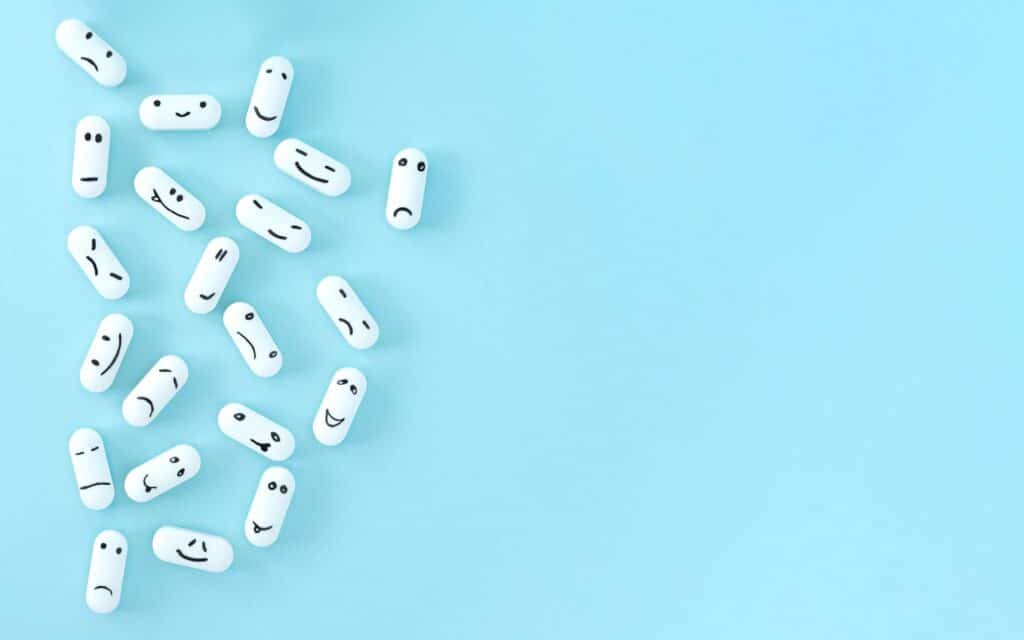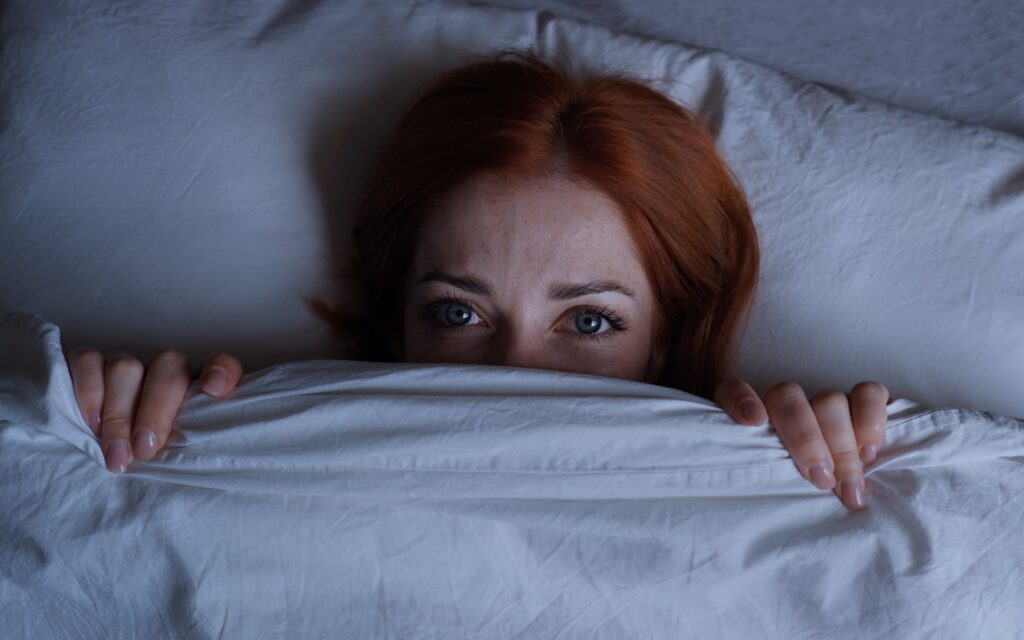Antidepressants and insomnia have an unfortunately strong link. While insomnia is a symptom of many mental health conditions, it’s also an issue made worse by several antidepressant treatment options. Indeed, the connection between antidepressants and sleep can make depressive symptoms even worse for some patients.
According to one of the largest reports ever conducted into depression treatments, 79% of patients on SSRI medications reported an inability to sleep in the middle of the night. What’s worse, the link between antidepressants and insomnia isn’t restricted to SSRIs alone.
Like with many medications, the secret to success is working with your doctor to find the right treatment. While many antidepressants can cause or worsen insomnia, there are a multitude of different treatment options to explore.
With a little experimentation and investigation, it’s possible to find an antidepressant that either doesn’t influence your sleep, or even helps your insomnia.
Let’s get to the bottom of why it’s so hard to sleep on some antidepressants.
Antidepressants and REM Sleep Behavior Disorder
There are a number of ways antidepressants can influence a person’s sleeping pattern, and we’ll address those in a moment. One of the biggest issues, however, is the influence antidepressants can have on REM sleep.
Studies into antidepressants and REM sleep disorders demonstrate these medications can alter the physiological pattern of sleep stages at night.
The most common antidepressant responsible for REM sleep disorders are those which influence the production of serotonin in the brain, such as SSRIs. These drugs trigger symptoms of REM sleep behavior disorder (RBD) in up to 6% of users.
Serotonin is a substance associated with mood management, but it’s also an important component of the sleep-wake cycle, or circadian rhythm.
As a result, drugs for modulating serotonin activity can often have an adverse impact on sleep. After taking antidepressants. Studies have shown otherwise healthy and depressed patients both experiencing decreases in the amount of REM sleep, as well as increased REM sleep onset latency.
Does SSRI insomnia go away?
The good news is research appears to indicate a greater impact on REM sleep from SSRI medications during early treatment. Usually, long-term treatment with an SSRI will eventually lead to a reduction in these symptoms.
However, there aren’t any hard and fast rules about when your insomnia may begin to diminish. Some people are unable to continue taking their SSRIs for long enough to allow the insomnia issues to dissipate. In the studies mentioned above, many patients saw their sleeping issues improve after 3-4 weeks of effective treatment.

Why is it hard to sleep on antidepressants?
Antidepressants are the most commonly accepted treatment for depression and many other mood-based disorders. Almost all antidepressants will have an impact on sleeping patterns. Studies show antidepressants often influence multiple aspects of the sleep cycle, including sleep initiation, maintenance, and REM sleep (as mentioned above).
The relationship between antidepressants and sleep is complex. Some antidepressants cause sleep issues during the early stages of sleeping, such as SSRIs.
Other antidepressants can cause long-lasting sleep problems, particularly when combined with underlying health issues. Before your doctor can choose the right antidepressant for you, it’s crucial to ensure they are aware of any other sleep related issues you might have. This could be restless legs syndrome or sleep apnea.
The impact antidepressants have on the brain and the use of serotonin for the sleep-wake cycle are just one example of how antidepressants and insomnia may be connected. Like most medications, antidepressants can also have a range of other side effects, which may indirectly influence your sleep pattern.
For many patients, the side effects associated with antidepressants are minimal, and will diminish after a few weeks of taking the medication. However, if your side effects seem intolerable, it’s important to speak to your doctor.
Some of the side effects of antidepressants which could prompt insomnia include:
Nausea
Nausea is a common side effect in the early stages of taking a new antidepressant. This problem often happens as your body is adjusting to the new substance. It may help to take your antidepressant with food, and drink plenty of fluids to reduce the sensation of sickness.
It might also help to take the tablet at night instead of in the morning. Feeling nauseous can cause insomnia by making it difficult to find a comfortable position at night.
Fatigue and drowsiness
Drowsiness and fatigue are also common symptoms of antidepressants during the early weeks. These symptoms can cause insomnia by prompting people to nap through the day, making it harder to sleep at night. You might find regular physical activities help you to tackle your drowsiness naturally. You can also look at taking your antidepressant at bedtime, if your doctor approves.
Dry mouth
Dry mouth is a possible side effect of many antidepressants. If your mouth feels constantly dry, you may struggle to fall asleep. You could also wake up more often to go to the bathroom if you’re drinking a lot of water to address the problem. Try chewing sugarless gum to help promote the creation of saliva. You can also consider sucking on ice chips.
Agitation and restlessness
Certain kinds of antidepressants can have a stimulating effect. Agitation and restlessness can often result from these medications. Having excess energy makes it harder to fall asleep, so it’s best to use this energy as effectively as possible. Get regular exercise into your routine and consider asking your doctor about the temporary use of relaxing or sedating medications for sleep.

Which antidepressant is least likely to cause insomnia?
Unfortunately, most antidepressants have a connection to insomnia. Antidepressants work by changing the balance of various chemicals in the body, which can throw you out of balance, increasing your risk of problems with sleep.
TCAs may be the least problematic option for people with pre-existing issues with insomnia, as they can help to relax the mind and body.
TCAs
Tricyclic antidepressants, otherwise known as TCAs, can sometimes be beneficial for people with insomnia. Certain products like amitriptyline and doxepin are a frequent choice among depressed patients who have sleep issues.
The TCAs best-known for their sleep enhancing effects are generally more effective at blocking the serotonin transporter than the norepinephrine transporter, which may have something to do with their results.
The majority of TCAs can still suppress REM sleep, however. This leads to a change in the frequency and intensity of sleeping and can increase the number of disturbing dreams or nightmares in some patients. If you’re concerned about TCAs and REM sleep, speak to your doctor.
MAOIs
Monoamine oxidase inhibitors are a very strong class of antidepressants which treat depression by preventing the breakdown of serotonin, norepinephrine, and dopamine. These antidepressants have proven very effective in the treatment of depression in general. They’re particularly well-suited for the treatment of severe depression and atypical depression characterized by low energy.
Many MAOIs are associated with latency in the onset of sleep, and increased awakening or arousal periods during sleep. Certain kinds of MAOIs are less likely to cause sleep problems. For instance, Phenelzine is usually more sedating and less frequently associated with insomnia complaints. Most MAOIs are associated with REM suppression.
SSRIs
As mentioned above, SSRI, or Serotonin uptake inhibitors are the most frequently associated with problems in the REM sleep cycle. A large number of studies have demonstrated the connection between changes in serotonin regulation and REM sleep.
SSRIs can influence sleep in a multitude of different ways. Some patients who take these medications report issues with insomnia, while others experience daytime somnolence.
Other side effects can include changes in the frequency of sleep, and the intensity and content of dreams. If patients are best-suited to treatment for depression with SSRIs, but doctors are concerned about insomnia, it is possible to prescribe additional treatments to improve sleep.
Selective SNRIs
Suitable for inhibiting both norepinephrine and serotonin transport, selective SNRIs can engage a broader mechanism of actions than most SSRIs. There are fewer polysomnographic studies available to demonstrate the impact of these medications on sleep. However, some reports have shown the potential for comparable results with SSRIs.
SRNIs, like SSRIs, can also cause disruption of sleep and the suppression of REM. However, the side effects associated with these medications may not influence everyone equally. It’s best to speak to your doctor if you’re concerned about SNRIs.
Atypical antidepressants
Various atypical antidepressants, like Trazodone, are also commonly prescribed to improve sleep in the depressed, but instances of insomnia and sleep disturbances can happen.
Trazodone can result in the disruption of sleep continuity and slow wave sleep. Trazodone also blocks histamine H receptors, which can lead to the potential for daytime somnolence.
As with most medications, changes in the dosage of atypical antidepressants will have an influence on your risk of various side effects. Lower doses of atypical antidepressants can be used as an off-label solution for treating primary insomnia without coinciding depression.

Does SSRI insomnia go away? Handling insomnia and antidepressants
As mentioned above, in some cases, the insomnia-based side effects you might experience with antidepressants can diminish with time. As your body adapts to the changes in neurotransmitters and hormones, the problems connected with the medication can disappear.
There are other factors which can influence how significant your symptoms might be. For instance, taking your medication at a different time may make it less problematic to your sleep.
Sometimes, your doctor may recommend taking your pills in the morning to reduce the influence on your inability to fall asleep. The dosage of your medication is a factor too.
Many medical professionals will initially give their patients a lower dose of most antidepressants, as this can reduce the risk of side effects. If you start on a higher dose than usual and begin to experience insomnia, you can talk to your doctor about reducing your dose.
If neither changing the time you take your medication, or adjusting your dosage has a positive impact on sleep pattern, the best bet will usually be to speak to your doctor.
As mentioned above, there are various forms of antidepressants available to experiment with. You may find you can even avoid antidepressants entirely by taking a different treatment approach.
Some people who have extremely negative responses to depression medication get better results using psychotherapy, CBT, and other forms of talking therapy to address various issues.
Melatonin and antidepressants: Managing antidepressants and sleep
If you’re having a hard time with antidepressants and insomnia, there are various options available to help minimize your side-effects. The most important thing to remember is you shouldn’t simply stop taking your pills. This can be very dangerous, and lead to various negative results, like REM rebound, and withdrawal symptoms.
You could consider taking natural supplements to assist with your sleep. Additionally, Melatonin and antidepressants can often work well together, but they should only be taken in unison with guidance from a medical professional.
Managing antidepressants and insomnia try the following options:
- Take your antidepressants in the morning: Take your antidepressants early so any stimulating influences they have will help to power you through your day.
- Exercise regularly during the day: Not only does exercise help to reduce the symptoms of depression, but it can also significantly improve your chances of a good night’s sleep.
- Avoid alcohol: Alcohol can worsen your feelings of depression and make various symptoms worse. This substance is also more likely to lead to issues with your circadian rhythm.
- Minimize stimulants: Try to avoid the use of any stimulants after mid-day, as it can take a long time for these substances to get all the way out of your system.
- Turn off technology: Avoid anything which might stimulate the mind at night, such as smartphones and television screens.
Hopefully you and your doctor will succeed in treating your depression with antidepressants, maybe even improve your sleep. Be patient and seek the proper guidance in good time.
Siestio. Sleep Matters.
Medical disclaimer
You must not rely on the information provided on our website as an alternative to medical advice from your doctor or other healthcare professionals. For more information read our full disclaimer here.







